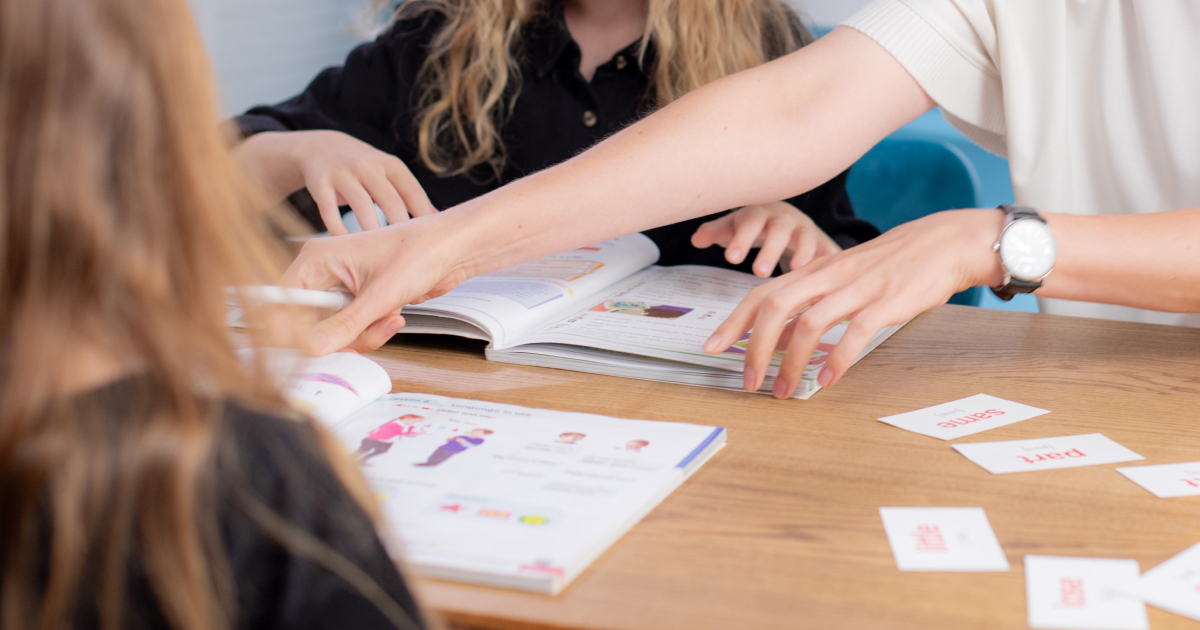
Teaching English to children with dyslexia
- Teaching qualifications
- Tips & Strategies
- Methodology

27.09.2023
Communicating with the younger generation is extremely exciting.
You can sometimes hear such thoughts that would not occur to even the most creative adult. And it is so amazing to have such an emotional experience!
Communication within the lesson has certain tasks.
For young learners, the development of speaking skills in a foreign language is as important as for other age groups.
First of all, teachers have to understand why they teach students to communicate and what is developed this way.

Master ESL lesson planning!
Create lesson plans with us!Communication forces children to think and speak at the same time.
While speaking and trying to express their points of view, they are developing valuable speaking skills.
During communication, students also learn to listen.
They must understand and accept what the other person is saying, even if their opinion differs.
Classroom communication helps children learn to think critically.
They learn to understand the reasons for their own feelings. This helps them, for example, explain why they don't like condensed milk, rather than just saying, "I don't know/ I do not like it".

Through communication, students develop public speaking skills.
They learn to articulate their thoughts when they are with a group of people and maybe under a little pressure. It helps to get out of the comfort zone and do something new.
Already at the first stages of communication, children acquire tolerance for other people and their opinions.
Communication among peers makes this possible because at an early age children begin to understand that not everyone thinks the same way as they do.
Promote emotional intelliegence in your class!
It seems that with each new generation, it is way harder to get children interested. I dare say that English classes are not at the top of their list of best pastimes.
However, you can use the leisure topics of today's children, and you will immediately notice the sparkles in their eyes when they talk about their favorite games, gadgets, clothes, or cartoons. We offer the 10 most relevant topics for discussion with young learners.

Develop your skills in the comfort of your home!
Enjoy our video library!As more and more people start playing video games it seems that gaming can become a great topic to discuss:
The list definitely goes on and depends solely on your imagination. Here are some more ideas on the possible topics:
Keep up with the latest ELT trends!
Everybody has gone to school at some point, right? It makes the topic of schools relevant for any age, background and level. Here are some ideas on what to discuss:

It’s hard to find a person who doesn’t like thinking about the future and wondering what awaits ahead. Discussing possible future scenarios always turns out to be very imaginative and fun:
Teach students to talk about the future correctly!
Aliens is another topic that students adore. If you doubt, just try it and you’ll see how lively their discussion may be with the help of these questions:

Movies are definitely a beloved way of entertainment. It’s true that students may like different types and genres of movies but it’s always interesting to compare your impressions and tastes to other people’s ideas. Also, it’s a great chance to discuss some extremely popular movies like “Barbie”, for example:
5 powerful movies for teachers!
During the era of the Internet, anyone can easily build some very interesting dialogues about the most important apps on their smartphones, the most favorite social media websites or the apps they hate, etc.:

Discussing TV series is always fun as now more and more people prefer following long and complex stories rather than watching a single 2-hour narrative. Chances are that your students have been watching the same series, so how about discussing them?
How to use authentic materials during your ESL class?
At first, the topic of fashion and shopping may seem to be not relevant for all the people as in your group you may both have some fashion gurus and students who are absolutely indifferent to any kind of trends. However, everybody buys something from time to time, everybody makes some fashion choices, sooo… Here are some questions on the topic that may be useful:

It may not be the most beloved topic but it is definitely the one everybody can contribute to. Use the following questions to start the discussion:
What about teaching English to adults?
Finally, it’s hard to find a person who doesn’t feel like talking about cute dogs or cats or doesn’t have one. Therefore, here are some question ideas for you:
Feel free to choose questions from the list according to the age of your students. Some can be discussed with the youngest, but the more difficult ones are suitable for discussion with teenagers.

During the conversation, students should feel comfortable and safe.
So, it is important to establish communication rules. For example, explain that during a conversation, students should listen carefully to their partners and respect their ideas and opinions.
You can introduce some ways in which students can ask additional questions or ask for clarification if they do not understand something. Also, teach students how to politely disagree with their partners.
More on classroom management online
Taking turns speaking English has several advantages. By talking with different classmates, children get to know new ideas and speech styles.
The different levels of knowledge and vocabulary of students will allow them to adjust to the interlocutor and thereby improve each student's speaking skills.
For each topic, students will need some vocabulary. For students to express themselves freely, provide them with a list of words that will be useful during the conversation.
Children may also be embarrassed to ask for help. So encourage them to ask questions and help each other.
In the Grade University library, you will find many useful webinars on the topic of communication with young learners, including Teaching YL: How to Use Stories in the Classroom, Classroom Activities that Spark Communication, and many more.
Use new techniques during your classes with Young Learners and teach English in a modern way!
There is no need to pre-tech the vocabulary that might be unknown.
Veronika Syrotkina
Author
CELTA certified teacher of General English
Comments
Leave your comment